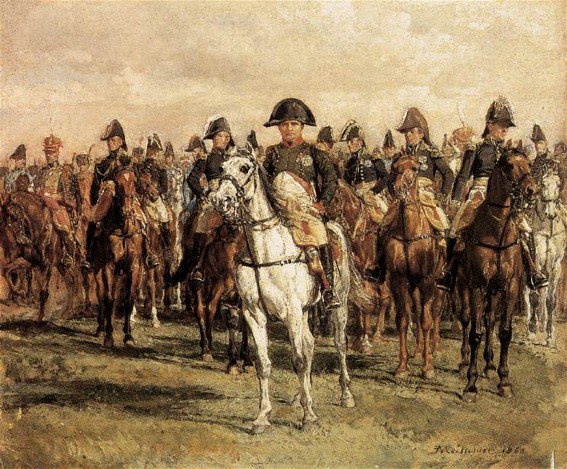Napoléonide
Napoléonide. A name for a proposed state to be established on the territory of Southern Ukraine in the wake of Napoleon Bonaparte’s invasion of Russia. According to Elie Borschak, the first historian to study this geopolitical project in the 1920s and 1930s, Napoleon was well-informed about Ukraine’s past and present and even empathized with Ukrainians’ alleged desire to free themselves from tsarist despotism. Furthermore, a high-ranking French official at the Foreign Ministry (Alexandre Maurice Blanc de Lanautte, Comte d’Hauterive) suggested the creation of a state of the Ukrainian Cossacks allied to France and named after the French emperor. These Borschak’s findings were largely accepted by generations of Ukrainian historians, but have been seriously challenged by Vadym Adadurov, a specialist in French-Ukrainian relations. Based on new discoveries in the French archives, Adadurov contended that the author of the project of Napoléonide was not the Frenchman Comte d’Hauterive, but the Pole Michał Sokolnicki (1760–1816)—a major-general in the army of the Grand Duchy of Warsaw and later aide-de-camp of Napoleon during his campaign in Russia in 1812.
In his memoranda commissioned by the French government (11 in total, between 1811 and 1812), this Polish supporter of Napoleon Bonaparte argued for a break up of the Russian Empire along national lines and for a further reorganization of eastern Europe after an imminent French victory. As a way to eliminate the Russian threat from ‘Europe’s gate,’ a number of peoples conquered by the ‘Northern Barbarians’ (Russians) were expected to join Napoleon’s ‘Great Empire.’ Among those peoples were Latvians, Estonians, Ukrainian Cossacks, and Crimean Tatars, who, according to Sokolnicki, would gratefully accept freedom from Napoleon’s hands. It is in this context that the duchy of Napoléonide is mentioned. Arguably the Polish author of the memorandum was among the first to suggest the idea of Ukrainian independence.
The project presupposed the creation of a set of ‘federated duchies’ on the territory between the restored Poland and the truncated Muscovy, among them two French puppet states in Left-Bank Ukraine and Southern Ukraine that would isolate Russia from Europe and block its access to the Black Sea. These buffer states, placed under Polish protectorate, but with their governments appointed by the French emperor, were to separate Europe’s ‘civilization’ from Asia’s ‘barbarism.’ One state would have included the territories of Chernihiv gubernia and Poltava gubernia and adjacent lands as far north as Orel. The other would have been a unified state of the former enemies: the Ukrainian Cossacks and Crimean Tatars. It would have been called Napoléonide and consisted of the territories of Katerynoslav gubernia, the Donets River valley, and Tavriia gubernia (including the Crimea). As Sokolnicki expected, once these communities are freed by Napoleon from the ‘Muscovite yoke,’ they would have become gradually civilized and joined the European family of nations. Although stillborn, never realized on political maps, Sokolnicki’s imaginative proposals clearly showed the importance of Ukraine and the Cossacks for the interests of Europe and its security.
In spite of a well-documented interest of the French authorities in Ukraine’s past and present, Vadym Adadurov’s research also revealed that the French had little to do with the proposed state to be named after their belligerent emperor. Napoléonide was not authorized by any high-ranking French official, let alone by Napoleon Bonaparte himself. In the end, the French were not keen on the idea of a separate Ukrainian state, be it the Duchy of Chernihiv or Napoléonide. Contrary to the fervent desires of Napoleon’s Polish allies, the emperor of the French was also reluctant to restore Poland in its pre-partitioned borders, instead toying with the idea of a few ‘duchies’ or ‘kingdoms’ in Right-Bank Ukraine and historic Lithuania, dependent on Paris but not united with the Grand Duchy of Warsaw. One possible reason for the lack of Napoleon’s consistent interest in Ukraine was the fact that his 1812 invasion of Russia was directed at the conquest of Moscow via Lithuanian and Belarusian territories, with western Volhynia being the only Ukrainian region occupied by his Grande Armée. A more plausible reason, however, was that Napoleon did not want to commit himself to any plan of territorial rearrangement of eastern Europe, for he intended to use conquered territories as leverage in his future settlement with the Russian tsar and as a way of compensating his Austrian and Ottoman allies.
BIBLIOGRAPHY
Borschak, E. ‘Napoléon et l’Ukraine,’ Revue des études Napoléoniennes, 19 (July–December 1922)
Borshchak, I. Napoleon i Ukraïna (Lviv 1937)
Adadurov, V. ‘Napoleonida’ na skhodi Ievropy: uiavlennia, proekty ta diial'nist' uriadu Frantsiї shchodo pivdenno-zakhidnykh okraїn Rosiis’koї imperiї na pochatku XIX stolittia. 2d ed. (Lviv 2018)
Serhiy Bilenky
[This article was written in 2021.]

